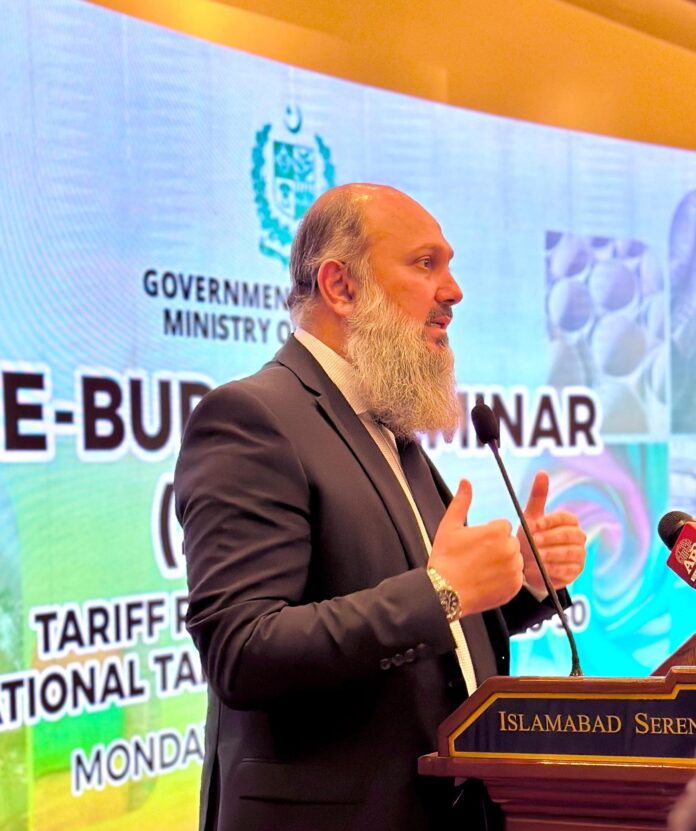- Advertisement -
ISLAMABAD, Feb 17 (APP):Federal Minister for Commerce Jam Kamal Khan on Monday emphasized for Industry-Government Collaboration at Pre-Budget 2025-26 Seminar.
Federal Minister for Commerce Jam Kamal Khan, while addressing the Pre-Budget Seminar 2025-26, highlighted the crucial role of industry-government collaboration in stabilizing the economy and shaping future trade policies.
The seminar, organized by the Ministry of Commerce, provided a platform for stakeholders to discuss economic challenges and the roadmap for tariff rationalization.
The minister acknowledged the difficulties faced in recent years but appreciated the resilience of the industry. “We have been partially successful despite many challenges. The industry has survived tough times, and I congratulate all stakeholders for their efforts. Their contributions have been effective in steering the economy towards stability,” he stated.
Reflecting on the economic turmoil of two years ago, Jam Kamal Khan pointed out the severe challenges, including 38% inflation, high interest rates, and an uncertain investment climate. However, he credited joint efforts between the government and the private sector for bringing stability. “If we compare today’s situation with two years ago, it is evident that stability has returned. This achievement is the result of industry’s contribution alongside government initiatives,” he remarked.
The Federal Secretary for Commerce, Jawad Paul, welcomed participants to the seminar, emphasizing its importance in shaping economic policy and fostering export-led growth.
He highlighted the role of tariff rationalization in reducing production costs, boosting competitiveness, and attracting foreign investment. Lower import duties on essential inputs have strengthened domestic industries, leading to increased exports and job creation.
Transparent tariff policies enhance investor confidence and economic integration through trade agreements.
The National Tariff Policy (NTP) 2019-24 successfully rationalized 85.75% of tariff lines, providing Rs. 92 billion in relief to businesses.
The new NTP 2025-30 aims to further support SMEs, green initiatives, and emerging technologies like AI and robotics.
The Ministry of Commerce remains committed to stakeholder engagement and targeted reforms to ensure sustainable economic growth and global trade integration.
He emphasized the importance of proactive policy discussions ahead of the budget. “We have decided to initiate extensive consultations well before the budget.
This is just the first session, and within two to three months, we will be in a stronger position to make informed decisions,” he stated.
The Minister Jam Kamal Khan, assured that the business community would be involved at every stage to ensure policy alignment. “Whatever policies we formulate, the business community will be on board. We will strive for consensus on the majority of issues,” he added.
Joint Secretary Muhammad Ashfaq gave a detailed presentation on the draft National Tariff Policy (NTP) 2025-30. He presented the impact analysis of the current policy (NTP 2019-24) and detailed contours of the new policy.
Discussing structural reforms, Jam Kamal Khan highlighted the involvement of 17 sectoral councils in policy recommendations, drawing parallels with the National Economic Development Board (NEDB). “The NEDB, chaired by Prime Minister Shehbaz Sharif, includes all key stakeholders. I firmly believe that any decision taken by this board will carry the weight of the Prime Minister’s vision, making it a powerful platform for economic progress,” he stated.
While addressing concerns about export policies, the minister reassured that local industries would also be encouraged. “Although our focus remains on increasing exports, we will ensure that local industries remain competitive. We aim to manage tariffs effectively to support domestic businesses while integrating them into the international market,” he explained.
The seminar was conducted in continuation of a week-long consultative session with the industry.
He emphasized that private-sector leadership is vital for economic growth. “The private sector has the potential to drive our economy forward. Over the past six to eight months, we have actively engaged with stakeholders, taken ownership of various business-to-business (B2B) meetings, and strengthened trade mechanisms,” he noted.
Jam Kamal Khan also underlined the government’s efforts in revamping key trade institutions. “We are restructuring organizations like the Trade Development Authority of Pakistan (TDAP), Export Development Fund (EDF), Export Facilitation Scheme (EFS), and the Directorate General of Trade Organizations (DGTO). TDAP, in particular, has done a tremendous job, and we are working to enhance its efficiency further,” he said.
He praised Prime Minister Shehbaz Sharif for his dedication to economic development. “Despite limited resources, the Prime Minister has closely monitored and supported trade initiatives. His commitment has been instrumental in strengthening Pakistan’s economic landscape,” he remarked.
Concluding his address, the minister reaffirmed the government’s commitment to inclusive and transparent policymaking.
“This pre-budget seminar marks the beginning of a continuous dialogue. We started this process with consensus, and we will conclude it with consensus, ensuring that our economic policies reflect the collective vision of all stakeholders,” he asserted.
The seminar concluded with active participation from trade bodies, chambers of commerce, exporters, and policymakers, setting the stage for further deliberations in the coming months.

